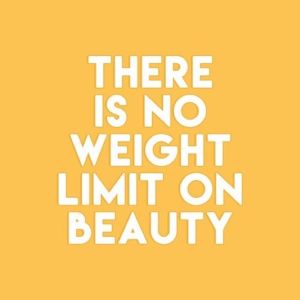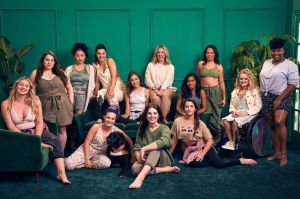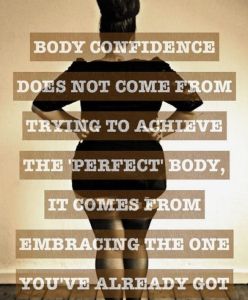
Photo via Instagram.
“No matter how many hours I spent at the gym and how healthy I ate, it wasn’t enough and I wasn’t losing the weight as fast and I felt everyone wanted. So, I felt that I had no other choice.”
Justice Ross, sophomore biomedical engineer major at Drexel University, suffered with bulimia for a few years and she believes that social media and body image pressure played a major role in her eating disorder.
“I was bulimic on and off for about 3.5 to 4 years. However, it didn’t get bad until the summer of my sophomore year and throughout my junior year of high school. During this time I was taking modeling more seriously and I wanted to do it nationally and more professionally,” Ross said. “Although, I was the thinnest I had ever been prior to it, agencies and who I was working with kept telling me that they wanted me to be smaller.”
Bulimia is an emotional disorder involving distortion of body image and an obsessive desire to lose weight, in which bouts of extreme overeating are followed by depression and self-induced vomiting, purging or fasting.
She also started using social media as a positive outlook on body image by following curvy models and becoming more comfortable in sharing pictures of herself and the way she looks.
“However, now that I’m a little older and the modeling industry has become more accepting I make sure to also follow curvy models.”
Justice, as well as many other celebrities, have suffered with an eating disorder due to the pressures of social media and wanting to have the “perfect” body.
Bulimia and other disorders are prevalent in both men and women of all ages, including the celebrities we see everyday on our screens. Celebrities, such as Demi Lovato, Paula Abdul, Russell Brand, Elton John, Princess Diana, and many more, opened up about their struggles with eating disorders and how social media had an effect on them, along with the stereotype of “skinny is beautiful.”
The Role of Social Media in Body Image
The rise of plastic surgery in millennials begins with social media. Media such as Instagram and Snapchat produced by celebrities have an influence on the way young adults perceive themselves.
When celebrities like The Kardashian/Jenner sisters, Chrissy Tiegen, Zac Efron, Ryan Gosling, Patrick Dempsey, etc. get any plastic or cosmetic surgery done, it gives a false advertisement of a natural look.
Maddie Werndl, a sophomore marketing and advertising major. said, “We look at social media and we want to change ourselves to mimic the models, actresses and stars we see on TV and social media.”
Social media shows photos of women with their hair done, full-face of makeup and a “barbie-like” body type consisting of a small waist, curves and long legs. On the other hand, men are portrayed as tall, muscular and with little-to-no body fat.

Photo via Instagram.
“Social media also and still does play a role in my body image and how I view myself. During that time, I had followed a lot of models and I used to think to myself, maybe if I was that thin I could be able to book more jobs,” Ross said.
The article, “The Media and Body Image: How it Impacts Your Self-Esteem,” mentioned that, “The way men and women look in the media creates an unrealistic image of what we think we should look like. Only around 5 percent of society resembles the images portrayed in the media.”
In the article “Social Media Detrimental to Self Esteem,” senior communication student Sydney Lynch said, “There is a sense of unrealistic expectations that is built up by social media, creating a feeling of self-consciousness and low self-esteem” because “we don’t see what is really happening in a person’s daily life.”
Gender and Body Enhancements
Does gender have an impact on how men and women look at themselves compared to others? What makes them want to change or alter the way they were born? Plastic surgery helps combat any insecurities and body dysphoria young adults feel, but to tamper with your body at a young age can only harm you as you get older.
Men and women are expected to look a certain way to feel confident in their own body- their own skin. This leads to an increase in cosmetic surgeries to feel more accepted in society and to make people feel more confident to be on social media and post pictures of themselves.
There is this ongoing concept that men have to look like Zac Efron, Jason Mamoa or Chris Hemsworth and have abs, muscles, tan skin, be tall, etc. One the other hand, women all over social media are getting body-shamed if they don’t look like Kylie and Kendall Jenner, Jennifer Lopez, Kim Kardashian, Catherine Paiz or any runway or Victoria Secret models with slim waists, long legs, makeup, curves in the “right places.”
For example, Victoria Secret model, Barbara Palvin was named the first plus-size model for Victoria Secret weighing 120 pounds and is 5’8″ tall.

Photo via Instagram.
Aerie started #AerieREAL mission to “empower women to love their real selves.”

Photo via Instagram.
“I thought about getting my stomach clipped so that I could lose weight faster…I’ve thought about getting breast enhancements. It was only after I started getting tattoos that I began to feel more comfortable in my body,”Allison Clark, an adjunct faculty member of gender and body studies major, said. “I felt as though a big shift in my body weight would distort the images that I’ve put on my body and I love them and that’s helped me begin to love myself.”
Although body image is an issue for both men and women, we tend to see more campaigns and models about body positivity in women more than men.
As of 2018, it was reported that women had an overall larger number in cosmetic procedures than men had. Women had a reported number of 14,676,921, while men had an overall number of 1,306,844.
Gabe Cano, a junior early education major, said, “The way that media portrays the perfect body for women is so harsh and it is hard being a woman in today’s society because there are many different definitions of what a “beautiful” woman is.” People should feel comfortable in the way they look and be able to post pictures of their bodies without feeling like they are going to be shamed for it.
To learn more about body image and body positivity, join the Body Image Coalition at Cabrini University. This is a student-led group that teaches the campus community about a lifestyle “rich with body acceptance, wellness and support.” It was founded in 2007 and the club “addresses issues and attitudes in our society related to eating habits and body image that can exert undue pressure to conform to the thin or “perfect” ideal.” Students can follow Cabrini’s Body Image Coalition on Facebook, Twitter and Instagram.

Photo via Instagram.


